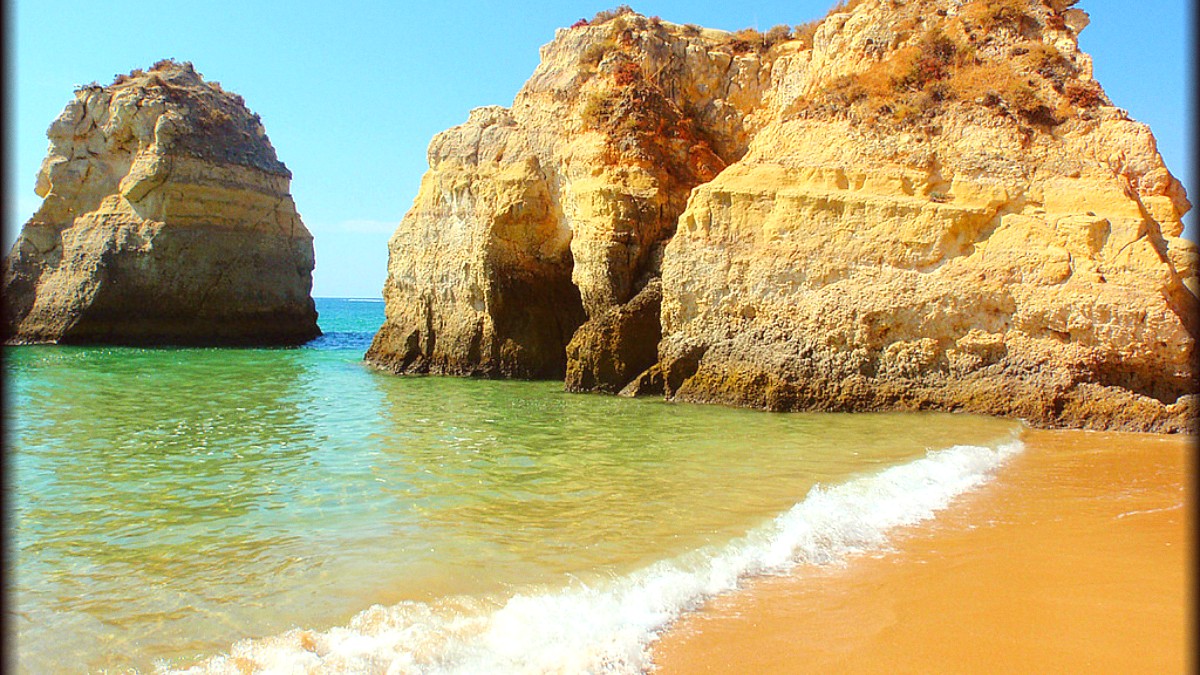
Portugal
Portimão experiences a Mediterranean climate, marked by warm, dry summers and mild, wet winters. This weather pattern presents appeal for much of the year.
Spring (March-May): Expect average highs from 15-22°C (59-72°F). Sunshine becomes more prevalent, and precipitation remains low. Evenings can be cool, so a Light jacket is helpful. Summer (June-August): These months bring hot, dry weather. Daily highs typically range from 25-35°C (77-95°F). Rainfall is minimal. Sea temperatures are at their warmest, ideal for swimming. Autumn (September-November): September continues summer warmth. Weather gradually cools. Chance of rain increases. Early autumn still features warm sea temperatures for swimming. Winter (December-February): Winters are mild. Daytime temperatures usually sit between 10-18°C (50-64°F). Many winter days are sunny and clear. Evenings are cooler, calling for warmer clothing.
Plan your visit considering activity preferences.
Beach and Water Sports: June to September for warmest sea temperatures and best conditions. Hiking and Cycling: Most comfortable temperatures in spring (March-May) and autumn (September-November). Sightseeing and Cultural Exploration: Year-round. Shoulder and low seasons present a more relaxed experience. Golf: October to May presents weather suitable for golfing, avoiding summer heat.
June - August
Warmest sea temperatures, full operation of services, nightlife, many festivals.
Very crowded, highest prices, intense heat possible.
April-May & Sep-Oct
Pleasant temperatures, fewer tourists, lower prices, sea warm for swimming in autumn.
Some seasonal businesses might not be fully open, slightly more rain.
Nov - March
Lowest prices, very few tourists, mild and sunny days for sightseeing.
Cooler weather, higher rain chance, many tourist businesses closed.
Portugal is a Schengen Area member. Non-EU/EEA/Swiss citizens without visa-waiver must obtain a Schengen visa for up to 90 days within 180-day periods. Apply at the Portuguese embassy. Visa-waiver citizens (USA, Canada, UK, Australia) do not typically need a visa for 90 days. From mid-2025 (verify exact date), visa-exempt non-EU nationals will need ETIAS authorization, an online pre-travel authorization. Long-stay visas apply for stays over 90 days.
Portugal imposes no general entry fees for tourism. Upon arrival, immigration officers at Faro Airport review passports and supporting documents. The process is generally efficient. No special permits are necessary for typical tourism. For specialized activities like research or commercial filming, specific permits may apply.
Valid for at least three months beyond departure, issued within 10 years, two blank pages.
Present proof of valid Schengen visa.
Demonstrate financial capacity for your stay (bank statements, credit card, cash).
Hotel reservations, rental agreements, or host invitation letter.
Evidence of confirmed departure from Schengen Area.
Trip costs vary greatly based on travel style and preferences.
The Euro (€) is Portugal's official currency. ATMs (Multibanco network) are widely available in Portimão, offering favorable exchange rates. Avoid airport currency exchange offices due to poorer rates. Credit and debit cards are accepted in hotels, most restaurants, and shops. Cash holds utility for smaller purchases, markets, and local cafes.
Tipping in Portugal is customary but not obligatory; it signifies appreciation for good service.
If your accommodation includes self-catering, buying groceries from local supermarkets (Pingo Doce, Continente) drastically lowers food costs. Enjoy free activities like beaches, boardwalks, and the old town.
Portugal generally is a safe country. Awareness of common concerns always provides value.
No specific vaccinations are mandatory for entry. However, ensuring your routine vaccinations are current constitutes a sound health practice. This includes MMR, DTaP, Polio, and seasonal Influenza. Hepatitis A and B are generally advised for most travelers. Consult your doctor or a travel clinic at least 4-6 weeks before your trip for personalized advice.
Health-related entry requirements are currently absent.
Hospital de Portimão (Centro Hospitalar Universitário do Algarve) handles emergency services and general care. Pharmacies (Farmácias), marked by a green cross, are abundant and well-stocked. Many pharmacy staff speak English.
EU/EEA/Swiss citizens: Carry your European Health Insurance Card (EHIC) for state healthcare.
Non-EU citizens: Expect to pay for services. Comprehensive Travel insurance or Digital nomad insurance from Insubuy is highly recommended.
Portimão generally is a safe city for tourists. Like any popular destination, it experiences petty crime. Petty crime, like pickpocketing and bag snatching, can occur in crowded areas like Praia da Rocha, the marina, bus stations, and markets, especially during high season. Nightlife areas call for caution. Car break-ins occur occasionally, specifically in isolated parking areas.
Overall Safety: Most Portimão areas are safe. Apply common sense, stay aware, trust your instincts.
Vigilance: Secure belongings, avoid displaying valuables. A Money belt under clothing holds passports/cash. Do not leave bags unattended. For valuables, consider Pacsafe security products.
Natural Disaster Risks: Wildfires present a threat during hot, dry summers, especially in rural areas. Flash flooding is possible with heavy winter rains. Heatwaves occur in summer. Portugal is not subject to monsoons or hurricanes. For delayed/canceled flights, AirHelp assists.
Drinking Water Safety: Tap water is safe. Many prefer LifeStraw or bottled water for taste.
Emergency Contacts: European Emergency Number: 112 (Police, Ambulance, Fire). For first aid supplies, see Adventure Medical Kits.
| Coverage Type | What it Includes | Consideration |
|---|---|---|
| Medical Emergencies | Doctor visits, hospital stays, emergency medical evacuation. | Highly recommended for all travelers. |
| Trip Cancellation/Interruption | Reimbursement if trip canceled or cut short due to unforeseen events. | Worth considering for significant trip investments. |
| Lost/Stolen Luggage | Reimbursement for lost, damaged, or stolen belongings. | Covers unexpected baggage issues. |